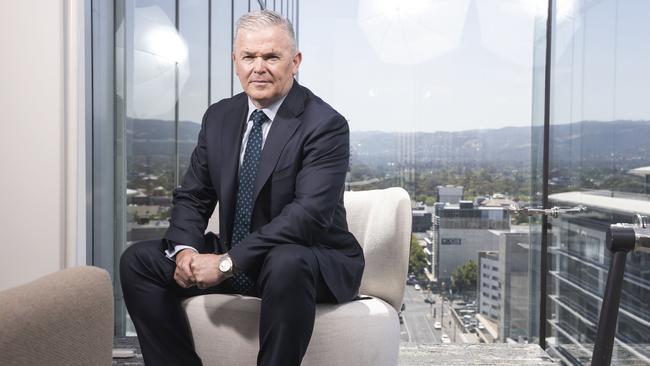Santos chief executive Kevin Gallagher says scarcity of new developments hindering supply
Gas price shocks and shortages are due to a decade of energy policy failures and competition laws that stop producers working together to meet demand, says Santos chief Kevin Gallagher.

Santos chief executive Kevin Gallagher says Australia’s competition laws prevented major Queensland gas exporters from acting early to try to alleviate some of the gas shortfalls that have sent prices spiking this week.
Speaking on the sidelines of a Melbourne Mining Club lunch on Thursday, Mr Gallagher said he had asked the Santos-operated GLNG to approach the state’s other two major LNG producers – APLNG and Shell’s QCLNG – more than a week ago as supply shortages loomed in the east coast market, looking for ways to increase supply into the domestic market.
“Just over a week or so ago, I contacted other LNG projects – I asked GLNG to actually do it – to see if we could voluntarily put gas back into the market. There were competition rules that got in the way of allowing the three projects to work together to do that – anti-competitive rules,” he said.
It is understood the three major exporters did not approach the competition watchdog over the potential joint action, concluding it would not be allowed under current competition laws.
The Australian Competition and Consumer Commission confirmed on Thursday it had not received any approach over a potential meeting of LNG producers.
But a week later, as spot gas prices spiralled upwards and wholesale electricity prices spoked, the Australian Energy Market Operator called an emergency conference of more than 100 industry participants to warn gas restrictions could be imposed amid the shortages.
It had already imposed on Tuesday a $40 a gigajoule cap on gas markets in Sydney, Melbourne and Brisbane after wholesale prices soared 80 times normal levels, and on Wednesday AEMO also invoked an emergency supply guarantee mechanism on gas producers for the first time since it was introduced in 2017.
With the new federal government of Anthony Albanese facing pressure to act quickly to reduce power prices across the east coast, on Thursday new federal resources minister Madeleine King opened talks with major Australian gas producers about ways to increase domestic supply – a possible prelude to triggering the Australian Domestic Gas Security Mechanism.
Mr Gallagher said he was not concerned that the federal government was seeking to ways to bring down gas prices in the immediate term, but warned that intervention in the market to restrict exports could have significant consequences.
“I don’t think that’s a bad thing. I think the government has got to do something in the short term, but that’s not a long-term solution. It’s not a long-term solution to start threatening the LNG projects where our overseas customers have invested billions of dollars for their own energy security,” he said.
Mr Gallagher said the Queensland gas producers were now supplying as much gas into the east coast market as pipelines would allow, and there was no additional capacity available for extra supply.
“The industry can’t do any more than it’s doing know, because that pipeline is at capacity. No more gas can come in from Queensland than is coming today – the industry is doing all it can from Queensland to support the east coast market,” he said.
Mr Gallagher said the current energy shortages were the result of a decade of inaction on the approval of new gas supplies, describing the lack of new gas projects as “frightening”.
He said there was little the industry could do to alleviate short-term deficits.
While Santos would be willing to speed up development of the company’s long delayed Narrabri development in NSW to meet soaring demand, he said that even if final approvals were granted this week it would likely still only be able to enter the market a year early, in 2025.
“It’s not going to be in three months’ time, or this year. We can start drilling wells, but we’ve got to build pipelines and plants,” he said.
But, with price caps being imposed on wholesale markets and supply shortages looming across major states, Mr Gallagher said it was time to act.
“The scarcity of new developments today is frightening with forecasts of tight supply over coming years.”
“Customers are crying out for this gas with more demand than we can meet when it comes to market around 2026. And I am trying to bring Narrabri to market earlier if that is possible.”
Narrabri could supply half of NSW’s gas needs but the project has been delayed for years and a final investment decision is only expected in 2023 following a 12-18 month appraisal program.
Santos is one of three major Queensland LNG exporters, and Mr Gallagher defended the conduct of the energy industry and said a squeeze on supplies could not be blamed on the big producers.
“Shortages in the domestic market and the price shocks we have seen in recent weeks have nothing to do with the behaviour of gas producers or exporters, who are doing everything they can to support the market right now,” Mr Gallagher said.
“This is the consequence of more than a decade of energy policy failure that has stopped the industry developing more gas supply in a timely manner.”
“If you want more gas, you’ve got to produce more gas and develop more gas. You can’t just conjure it up magically when coal fired power stations turn off and renewables underperform,” he said.



